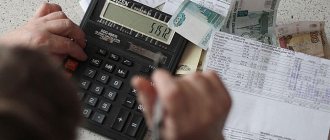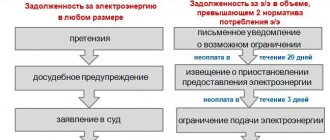There may be several reasons for non-payment of payments:
- the owner is absent and does not live in the residential premises;
- the owner does not have money to pay utility bills (financial difficulties);
- the owner does not want to pay utility bills.
In accordance with the law, namely in accordance with Article 155 of the Housing Code of the Russian Federation, regardless of the reasons, owners are obliged to pay fees for residential premises and utilities. And they must do this every month no later than the 10th day of the month following the previous month. However, there are situations in which utility debt will help avoid negative consequences, for example, eviction from an apartment. Such reasons may include the owner’s long-term illness, but in this case, utility services must provide evidence of this circumstance.
What are the consequences of non-payment of utility bills?
If utility bills were not paid only once, there will be no penalty. Penalties begin to accrue only after 31 days of late payments. Penalties are calculated based on the rate of the Central Bank of the Russian Federation on the date of delay. Penalties are charged for each day of delay. Penalties are calculated based on 1/300 of the rate of the Central Bank of the Russian Federation, if the period of delay is from 31 to 90 days, and starting from 91 days, they are 1/130 of the rate of the Central Bank of the Russian Federation. The amount of penalties can be calculated using the following formula:
Amount of penalties = amount of debt for utility bills X number of days of delay X 1/300 (1/130) X refinancing rate of the Central Bank of the Russian Federation.
Accordingly, in order to calculate the amount of penalties, you need to know the refinancing rate of the Central Bank on the date of late payment.
What awaits the debtor?
What happens if you don't pay rent? If the period of debt on utility bills exceeds 3 months , then the defaulter receives a notification from the management company about a possible restriction in the provision of utility services within 30 days.
If during this time the defaulter does not repay the debt for utility services, then the management company has the right to suspend the provision of services at the specified address without a court decision and apply to the courts with a demand for debt collection.
If the court makes a positive decision, a procedure will be launched to collect debts on utility bills.
Is it legal to charge for intercom every month? Find out about this from our article.
Consequences of non-payment for owners
For owners of privatized apartments, debt collection threatens an inventory and forced sale of property. After the inventory of the property, the owner is given the last opportunity to repay the debt within 5 days.
If the defaulter does not repay the debt, then the described property is seized and sold.
Also, the owner of a privatized apartment faces confiscation of wages and other sources of income to pay off the debt.
This is important to know: Law on recalculation of utility bills in the temporary absence of tenants
Implications for council housing tenants
For tenants of council housing, the consequences may be more serious than for owners. In addition to the measures applied to owners, the tenant faces forced eviction from the occupied living space.
By law, such measures apply to debtors whose debt exceeds 6 months.
In this case, the tenant and his family members are provided with municipal housing based on the minimum social norm (6 m2 per person).
According to the law, relocation cannot be carried out if the housing from which the tenant is being evicted is the only one available for the defaulter and his family members.
Information on the procedure for replacing hot and cold water meters can be found on our website.
Measures taken by public utilities due to non-payment of utility bills
If the owner does not pay utility bills, then the following measures may be applied to him:
- calls;
- personal delivery of receipts against signature;
- posting lists of debtors in entrances, etc.;
- written warning;
- accrual of penalties;
- partial shutdown of utilities (for example, turning off water for 2 days);
- complete shutdown of utilities;
- debt collection through court;
- eviction from residential premises through the court.
- How is the issue of collecting debt on utility bills resolved through court?
If payment for utility bills is made at least in small installments, then the case will not go to court. From June 1, 2020, the procedure for collecting utility bills from debtors has been simplified. After submitting documents to the court, a decision is made within 5 days by court order. By court decision, all accounts and cards of the owner are seized and money is written off from them. The entire amount of debt, penalties, fines, and legal costs are written off. The debtor also has the opportunity to enter into an agreement on debt restructuring if for some reason he cannot now pay the entire amount of the debt. The agreement is concluded for six months (by agreement it can be concluded for a longer period) with the possibility of extension. The agreement will specify how long the debtor undertakes to repay the debt, on what dates the debt will be repaid, what amounts will be paid, etc. To do this, write an application to the management company. If the debtor has a very large debt, and he is not going to pay it in any way, then bailiffs are brought in to resolve this issue. What can bailiffs do? They can:
- send the writ of execution to the main place of work of the working debtor;
- seize property;
- seize seized property;
- sell property at auction;
- limit travel from Russia;
- limit registration actions with property;
- other measures.
The property includes:
- cash;
- property;
- property in the apartment;
- securities;
- real estate.
According to the writ of execution, you can recover up to 50% of your monthly income. Pensioners will have their pensions and other income seized. For disabled people, debt can be collected using a disability pension, but if the debtor is incapacitated, this method will not be used. If there are several owners, then in order to collect the debt, the bailiffs will describe that part of the property in the apartment that belongs to the owners according to the title documents.
Control over payments
When signing an agreement with the Management Company, the residents of the house stipulate a list of services that will be provided by the management company. And it is these services that should appear on rent receipts. But sometimes you can see unfinished home maintenance work there.
In this case, you should submit a collective or individual application to the Company’s management, achieve recalculation and exclusion of fictitious services.
If there is no response from the service company, you should contact the Housing Commission. The statement indicates who is issuing the illegal invoices and whether the Management Company has been contacted.
But it is also possible to pay for some services without a contract if residents consider them important and relevant. For example, the Management Company hired a concierge for the house, who was not provided for in the contract. The residents of the house appreciated this service highly and decided to include it in the contract list.
If the apartment owner agrees with the receipt, which also includes unforeseen services, he simply pays for them.
If the municipal housing tenant does not pay utility bills
With social hiring, a citizen, who is also an employer, enters into a social rental agreement with the municipal authorities. The social rental agreement states that responsibility for timely payment of utilities falls on the shoulders of the tenant. He is obliged to pay for:
- electricity;
- hot and cold water supply;
- heating;
- gas supply;
- drainage
Other payments, such as major repairs, must be paid by the municipality. If the tenant does not pay utility bills, he is subject to eviction. In this case, the debt must be overdue for 6 months or more. However, when evicting a tenant, the municipality is obliged to provide him and his family members with other housing, but with a smaller area. If in the future the tenant regularly pays utility bills, he can write an application for improvement of living conditions. You can also avoid eviction by paying at least small amounts. In case of repeated violation, the tenant may be evicted completely, without the right to receive another living space.
Peculiarities
It is necessary to pay for utilities provided by the Management Company, Housing Office, Homeowners' Association, as well as suppliers of basic resources. This is the responsibility of all homeowners - apartments, private houses. Only in exceptional cases can consumers refuse both services and payment for them:
- With the low quality of such services. If the supplier provides water with a dangerous composition or serves cold water instead of hot water, this fact should be recorded, and in the future, payment can be refused based on the report.
- You also need to notify the Management Company in case of prolonged absence from your place of residence, in which case it will also be possible to refuse most of the payments.
In order to always keep the house in excellent condition, under any circumstances you need to pay for the maintenance of the house, cleaning in it and in the surrounding area. You can cut off the supply of water or electricity, but you must pay for heat.
If the tenant does not pay utility bills
According to the law, namely according to Article 616 of the Civil Code of the Russian Federation, if an apartment is rented out and tenants live in it under a lease agreement, then responsibility for paying utility bills to utility services is still assigned to the owner of the property. The presence of temporary or permanent registration of the tenant, however, does not shift the responsibility of the owner to him. If the lease agreement provides for payment of utility bills, and the tenant did not pay them, the owner has the right to sue the tenant. He can legally demand compensation for the entire amount of unpaid utility bills, penalties, fines under the lease agreement, legal costs, moral damages, etc. The owner also has the right to evict such a tenant. To avoid such situations, when concluding a lease agreement, it is necessary to immediately stipulate such points and provide for liability for non-payment of utility bills.
How are penalties calculated?
The penalty is calculated based on the refinancing rate and is 1/300
of the amount established at the time of calculation.
After three months of non-payment, its size increases to 1/130
. In the language of accountants, penalties are called annual interest collected from the debtor in favor of creditors. Information about the debt to utilities and energy supply companies is entered into the general account as a separate line, indicating the period for which the debt arose. Please note that it will not be possible to avoid paying penalties for utilities, since they will already be included in the total amount.
Can I be evicted from my apartment for debt?
The privatized apartment is part of the debtor's property. Accordingly, theoretically, it can be sold at auction in order to pay off debts to creditors. But only a bank can seize the only housing if the square meters act as collateral for the loan
.
It’s another matter if a citizen has other square meters. Then the bailiffs may well seize the apartment and then sell it in order to pay off the debt from the proceeds. The consequences of non-payment of utilities for users of municipal housing are more dire. Malicious debtors can indeed be evicted from rented square meters if, within 6 months
after notification of the debt, funds have not been received into the personal account. In fact, this extreme measure is rarely used, since it is technically difficult to do.
Citizens who do not have other housing are required by law to be provided with an apartment of a smaller area. In addition, if the tenant pays half of the debt, he will no longer be considered a malicious debtor.
Restriction or termination of services due to debts for housing and communal services
According to the decree of the Russian Government dated 05/06/11 (document number 354), if arrears arise in paying utility bills, restrictive measures may be applied to the violator
.
This is expressed in the supply of energy resources according to a certain schedule. In practice, this will look like lowering the hot water temperature by a few degrees or turning on the electricity for a few hours a day. In private households there is no technical ability to set restrictions. A different measure of influence is applied to such debtors - complete disconnection
. The debtor will not be left without cold water or heating, but public utilities have the right to turn off hot water. A complete cessation of energy supply can also be applied if, 5 days after the introduction of restrictions, the debt has not been paid.
The supplier is obliged to inform the debtor 3 days before punitive measures are taken.
Utilities have the right to disconnect without warning if the fact of unauthorized connection to in-house systems or centralized networks has been established. After the monetary issue is resolved, supplies are resumed in the same volume. Reimbursement of costs associated with the resumption of supply is borne by the resource supplier to the consumer.









